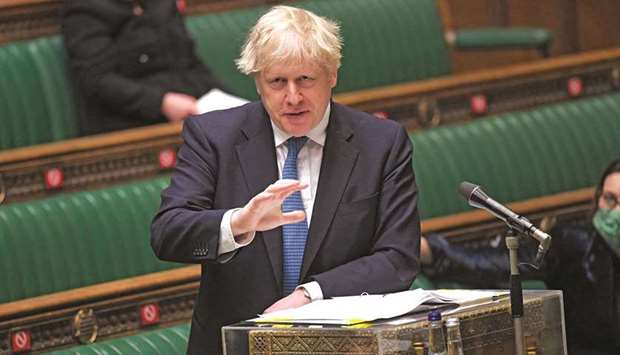An independent public inquiry into the British government’s handling of the coronavirus pandemic will be held early next year, Prime Minister Boris Johnson said on Wednesday.
The country had “found itself in the teeth of the gravest pandemic for a century” and the state has “an obligation to examine its actions as rigorously and as candidly as possible and to learn every lesson for the future”, he told lawmakers.
Britain has been hit hard by the outbreak, with more than 127,000 deaths since March last year — the world’s fifth highest official toll, according to data collected by this agency — raising questions about why it has fared worse than other nations.
Johnson told parliament the inquiry would be established on a “statutory basis”, with oral evidence given under oath and powers to “compel the production of all relevant materials”. The British leader, who had for months resisted calls to detail when an inquiry would begin arguing it would hamper the ongoing response, added he expected it to launch in spring next year.
The government in London has said it will work with the UK’s devolved administrations in Scotland, Wales and Northern Ireland to determine the probe’s scope.
Confirmation of the inquiry comes as months of lockdown restrictions are being eased, while the number of cases of Covid-19 and deaths has fallen sharply alongside the continued roll-out of the vaccination campaign.
Opposition Labour leader Keir Starmer called for the inquiry to start “as soon as possible”. Johnson, however, said the start had to be delayed so it did not “weigh down the efforts of those engaged in protecting us every day”. The events of the last year needed to be looked at in the “cold light of day”, he added.
An organisation representing families bereaved by Covid-19 welcomed the inquiry, calling it a “huge relief”, but also pressed for it to start sooner.
“Spring 2022 is simply too late to begin,” Jo Goodman, co-founder of Covid-19 Bereaved Families for Justice, said.
“Lives are at stake”, she added, arguing an earlier inquiry last year could have prevented a wave of virus deaths in Britain over the winter.
Goodman said bereaved families needed to be involved in the inquiry from the outset.
The prime minister’s spokesman told reporters an inquiry chair would be named “in due course” and Johnson would give evidence if asked.
His leadership has come under scrutiny since the start of the outbreak.
Johnson has been accused of being too slow to impose a nationwide lockdown to contain the virus at the outset, and too fast to lift restrictions once the first wave passed.
There were also initial problems with the supply of protective equipment to frontline workers, testing capacity, and glitches in an app to trace contacts. The prime minister has denied he dismissed the prospect of a wave of Covid-19 deaths, following reports he said he would rather let “bodies pile high in their thousands” than impose a third lockdown.
Ultimately, Johnson did order a new round of restrictions in January.
Johnson’s former top aide Dominic Cummings has publicly called into question his ex-boss’ judgement at key moments during the pandemic.
He is due to give evidence to a separate parliamentary inquiry into the government’s Covid response later this month.

A handout photograph released by the UK Parliament shows Britain’s Prime Minister Boris Johnson updating MPs on the Covid-19 pandemic in a socially distanced, hybrid session at the House of Commons, in central London, on Wednesday.
